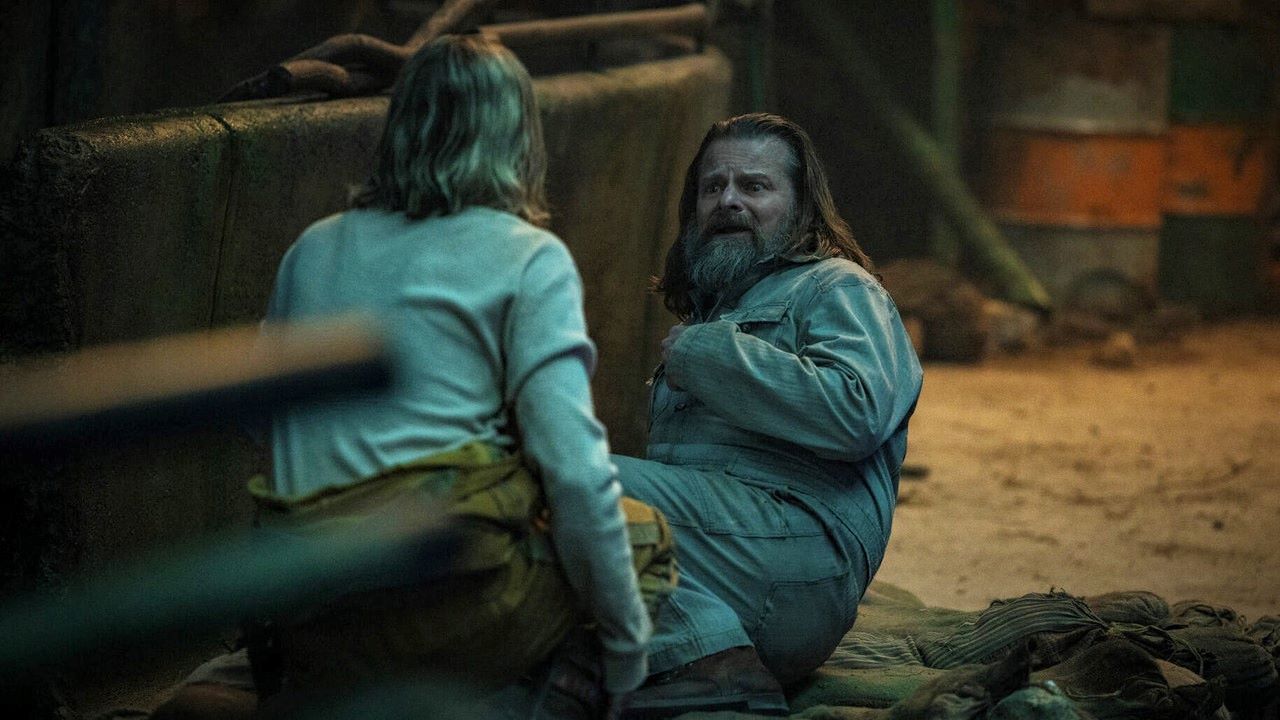
Episode 3 of Silo’s second season, titled Solo, skillfully intertwines themes of isolation, trust, and survival with the show’s broader exploration of dystopian power dynamics. It’s a character-driven episode that slows the pace to delve into the psychological depths of its protagonist, Jules (Rebecca Ferguson) while building on the season’s overarching narrative of rebellion and resistance.
The episode begins with Jules adjusting to the new silo she discovered after her exile from the original one. This second silo is a fascinating enigma, a stark departure from the strictly regimented world she left behind. Its silence and disrepair create a hauntingly introspective setting, offering Jules—and the audience—a chance to catch their breath after the chaos of the previous episodes. Rebecca Ferguson, as always, delivers a magnetic performance, portraying Jules with a nuanced blend of resilience and vulnerability.
Jules’ interactions with Solo (played by Steve Zahn), the titular character, form the emotional heart of the episode. Solo is a mysterious survivor who has adapted to this strange, isolated world in ways Jules struggles to comprehend. Zahn’s portrayal is layered, infusing the character with a mix of eccentricity and profound loneliness. Their dynamic is one of cautious trust—Solo’s guarded hospitality contrasts with Jules’ need for connection and information. These interactions are a study of the complexity of human relationships under extreme circumstances, and they lend the episode its emotional heft.
Meanwhile, the original silo is far from quiet. The brewing rebellion, sparked by Jules’ revelations and exile, is reaching a boiling point. Tim Robbins’ Mayor Bernard and Common’s Robert Sims continue their Machiavellian scheming to maintain control, even as cracks in their authority begin to show. The show deftly handles this storyline, using the rebellion as a counterpoint to Jules’ isolated journey. While the tension is palpable, the split narrative occasionally feels uneven, with the rebellion scenes lacking the same emotional immediacy as Jules’ story. However, this division sets the stage for a dramatic convergence later in the season, making the temporary imbalance a minor flaw.
Visually, Solo is a triumph. The production design of the new silo is breathtaking, capturing a world that is both familiar and alien. The details of the set—the crumbling infrastructure, the eerie stillness—create a sense of unease that mirrors Jules’ own disorientation. This is complemented by the show’s signature use of lighting and cinematography, which emphasize the claustrophobia and isolation inherent in the silo’s architecture. The new environment feels alive, almost a character in its own right, contributing to the episode’s immersive atmosphere.
The writing in this episode shines in its restraint. By focusing on Jules’ internal journey and her tentative interactions with Solo, the script avoids unnecessary exposition, allowing the audience to piece together the mysteries of the second silo alongside the protagonist. This approach reflects the show’s broader commitment to thoughtful storytelling, where answers are earned rather than handed out.
Yet, the episode is not without its shortcomings. The rebellion storyline, while essential, occasionally interrupts the pacing of Jules’ narrative. Some scenes in the original silo feel rushed, with characters’ motivations and decisions left underexplored. These moments stand out against the careful, deliberate unfolding of Jules’ story, creating a slight tonal dissonance. Additionally, while the introduction of Solo adds depth to the new silo, some viewers might find the character’s backstory too thin, leaving questions about his past unanswered.
Despite these minor issues, Solo is a standout episode that underscores why Silo has become a highlight in the dystopian genre. The show’s ability to balance intimate character studies with high-stakes drama remains its greatest strength. Jules’ journey in this episode is both a personal odyssey and a microcosm of the show’s larger themes—how systems of control impact individuals and how resilience and hope can flourish even in the bleakest circumstances.
The episode also serves as a reminder of the series’ exceptional cast and crew. Ferguson continues to prove why she is the emotional anchor of the show, while Zahn’s addition to the cast is a welcome one. Behind the scenes, the production team’s attention to detail elevates the world-building, and the writing remains sharp, weaving social commentary seamlessly into the narrative.
In conclusion, Episode 3 of Silo Season 2 is a deeply atmospheric and emotionally resonant chapter that moves the story forward while taking the time to explore its characters and themes. It’s a testament to the show’s ability to keep viewers engaged, even when the answers to its mysteries remain tantalizingly out of reach. With its sharp performances, stunning visuals, and thoughtful storytelling, Solo sets the stage for what promises to be an intense and rewarding season. If you're looking for a blend of psychological depth, dystopian intrigue, and visual excellence, this episode is a must-watch.
Final Score- [8/10]
Hi Everyone, after a due consideration, we have decided that we will be open for donations to help us in managing our website. We will be greatful for any kind of amount we receive. Thanks!
— Midgard Times 🎬 (@Moviesr_net) January 4, 2026
PayPal- [email protected] pic.twitter.com/DlNNz5Npm5
Get all latest content delivered to your email a few times a month.
Bringing Pop Culture News from Every Realm, Get All the Latest Movie, TV News, Reviews & Trailers
Got Any questions? Drop an email to [email protected]